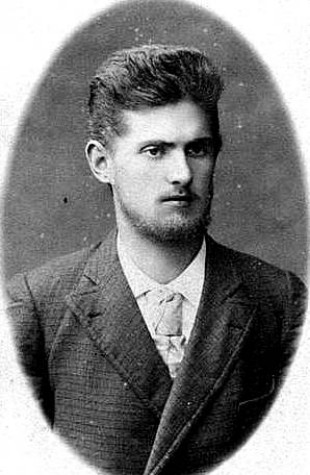Kistiakovsky, Bohdan
Kistiakovsky, Bohdan [Кістяковський, Богдан; Kistjakovs’kyj], b 4 November 1868 in Kyiv, d 16 April 1920 in Katerynodar (today Krasnodar) in the Kuban. Influential jurist, sociologist, and philosopher of law; the son of Oleksander Kistiakovsky; brother of Ihor Kistiakovsky and Volodymyr Kistiakovsky; father of George Bohdan Kistiakowsky, and nephew of Volodymyr Antonovych. He studied at Kyiv University (1888–90), Kharkiv University (1890), and Dorpat (Tartu) University (1890–2). He received his PH D from Strasbourg University in 1899. By 1902 he had abandoned Marxism and philosophical materialism, becoming an avowed neo-Kantian, and developed a profound interest in the epistemological and methodological foundations of the social sciences and social theory.
Kistiakovsky had close contacts with the Galician Radicals (including Ivan Franko and Mykhailo Pavlyk) and the Russian liberal émigrés grouped around Petr Struve; he helped Struve to edit the well-known journal Osvobozhdenie (1902–5). He also developed a mutually beneficial association with the social philosopher Max Weber.
Kistiakovsky taught at the Moscow Commercial Institute (1906–11), Moscow University (1909–10), and the Demidov Juridical Lyceum in Yaroslavl (1911–17). In 1912 he became the editor of the influential law journal Iuridicheskii vestnik (Moscow 1913–17). A lifelong supporter of the Ukrainian national movement, he returned to Kyiv in 1917 and became a professor at Kyiv University. In 1918 he was appointed to the State Senate and the General Administrative Court (see General Court) of the Hetman government and served on the commissions for drafting the law on Ukrainian citizenship and the statute of the newly founded Ukrainian Academy of Sciences (UAN). In 1919 he was elected a full member of the UAN; he sat on its Legal Terminology Commission and the Commission for the Study of Social Movements and held the chairs of state law, administrative law, and international law and of sociology.
Kistiakovsky contributed many articles (some under the pseudonym Ukrainets) to Russian scholarly, popular, and political periodicals. He edited Russian translations of Western scholarship and the bibliographic journal Kriticheskoe obozrenie (Moscow 1907–10). His chief works include his well-received dissertation Gesellschaft und Einzelwesen: Eine methodologische Untersuchung (1899), Stranitsy proshlogo: K istorii konstitutsionnogo dvizheniia v Rossii (Pages from the Past: Towards a History of the Constitutional Movement in Russia, 1909), and Sotsial’nye nauki i pravo (The Social Sciences and Law, 1916), an important compendium of his sociological articles that earned him another PH D (from Kharkiv University). He also contributed articles (under the pseudonym Khatchenko) to the Moscow Ukrainophile journal Ukrainskaia zhizn’ (1912–17) and edited and wrote long introductory essays to the political works of Mykhailo Drahomanov, who influenced his views.
Kistiakovsky is regarded as having been an original and leading proponent of neo-Kantianism and formal sociology in Western Europe and in the Russian Empire. Alexander Vucinich has devoted a chapter to his life and ideas in his Social Thought in Tsarist Russia: The Quest for a General Science of Society, 1861–1917 (1976). Larysa Depenchuk’s book Bohdan Kistiakivs'kyi was published in Kyiv in 1995.
Roman Senkus
[This article was updated in 2014.]
